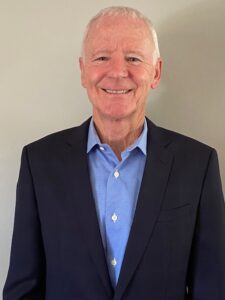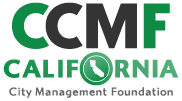What inspired you to enter city management?

During my junior year at Cal State Long Beach, I came to the realization that a career in public service was something that interested me the most; though, at that time, I was looking at teaching or law enforcement. I was a political science major, however it was a history professor teaching a class about the Roosevelt presidency who introduced the idea of going into city management. Growing up in the city of Los Angeles, I didn’t know much about city management. However, through the guidance of this professor, I applied to the graduate program at USC to pursue a master’s degree in Public Administration.
How did I become a city manager?
While in graduate school I was able to secure an internship in the city manager’s office with the city of Arcadia. This experience provided me with a great overview of the city manager’s role and the variety of the work, as well as how managers can have a positive impact on the daily lives of those within the community. Upon graduation, I got my first full time position with the city of Simi Valley as an entry level administrative assistant (today, it would probably be called a management analyst). It was a very fortuitous move for me because Simi Valley had an excellent reputation for providing opportunities for professional growth by rotating management staff within various departments. I first worked on community service programs such as youth and senior services, as well as grant programming. I then rotated to planning, overseeing annexations, budget, grants and preparing cost benefit analysis on various projects, which gave me an excellent introduction to planning and development. From there, I was promoted to the city manager’s office and had the opportunity to work on budget, economic development, agenda oversight and special projects.
At that point, I had seen or known several former Simi Valley assistants take city manager positions with various Southern California cities, and I came to the realization that I could also become a city manager. So, while it wasn’t on my initial list of things I wanted to achieve as a career goal, it was something that I thought I could do and enjoy. I became the city administrator for the city of San Fernando in November 1982 at the age of 31.
What do you enjoy the most about your role?
The variety of projects and activities one is involved with provides such great opportunities to work with city council, staff and the community. Every day is different, and one of the things I feel so fortunate about is that I genuinely enjoy working with staff and interacting with all the various constituencies in our communities.
What role does the city manager play in local government, and how do you feel it differs from that of a council member or mayor?
It’s imperative that the city manager Is committed to maintaining a professional approach and demeanor in their role. The manager not only serves the city council but oversees all staff operations and oftentimes is the face of the organization. While elected officials may often represent certain constituencies and policies, the manager must be open-minded and treat all equally and fairly—no easy task in today’s volatile environment.
What does your typical day look like?
My typical day actually begins the evening before I leave the office for the day. I review my calendar and prioritize things that require my attention. Before I leave home for the office the following morning, I’ll again check my emails to see if there is something that needs my immediate attention or response. However, I’ve learned like everyone else that the best-laid plans can run amiss when a councilmember drops by unannounced the first thing in the morning to discuss some matter. From that point on, I try to stick to my schedule but try to leave some unencumbered time to account for the unexpected, including the unending emails. In the interim city manager work I have done (eight interim city manager assignments since my “retirement” at the end of 2011), I try to take time to be visible around city hall and other city facilities and introduce myself so staff can place a name with a face. I consider myself to be an energetic, positive person with a solid skill set and a sense of humor (but for the most part used in a self-deprecating manner). I believe those traits have helped me bring a calming influence during these transitions while recognizing the need to quickly get up to speed and ensure I am aware and fully engaged in understanding the city council’s priorities and expectations during this transition.
What city project are you most proud of?
Having started my career in 1975 and working intermittently doing interim work for the last several years, it’s difficult to single out a specific project during a 49-year span. Like many of my colleagues, I’ve overseen multiple capital improvement projects such as police stations and fire facilities, senior centers and other complex improvement projects. However, what stands out the most is not a specific project per se, but my interim work with the City of San Fernando in 2013, assisting the newly elected City Council turn things around from both a fiscal as well as an organizational standpoint. Faced with a totally dysfunctional city council that was garnering headlines throughout the region and a complete lack of transparency regarding the City’s fiscal position, three council members were recalled, and I was appointed interim city manager by the new council. With the commitment and work of all five council members and a staff eager to do the right thing, we were able to stabilize the city finances and address the organizational issues to help turn around the city. It was a rewarding experience and gave me the opportunity to return to help the city that provided me with my first manager position years earlier.
What are the greatest challenges facing city managers in the state today?
Certainly, many of the challenges today are different and more complex than those I faced much earlier in my career. One thing though, there will always be challenges involving the relationship with the state, particularly in the fiscal area. City managers today are dealing with greater polarization and lack of civility in the public discourse, along with state mandates attempting to address complex issues such as climate change and housing production, which cause significant consternation and conflict within our communities, and managers are front and center in the arena. The work now seems to be 24/7, always accessible, which places added stress to maintain a work/life balance.
When and how do you interact with the residents of your city?
This is an aspect of the job that I genuinely enjoy. During my city manager career prior to retirement, I made efforts to attend as many city events and activities as I could, which provided me with the opportunity to interact with the residents and also support the programs implemented by staff. I also make myself as accessible as possible on a day to day basis, which admittedly is not as easily done within larger organizations. In my interim roles, I have had to be more judicious with my time due to Public Employees’ Retirement System (PERS) rules on hours worked, so I had to prioritize my time and focus on interacting with staff during these assignments. I believe it can have a beneficial effect to interact with staff as much as possible, particularly when there is a level of organizational anxiety when a city manager departs on short notice.
What is the role of a city manager in upholding the publics’ trust in local government?
The city manager is the leader and face of the organization, and, therefore, must set the example. It’s been said that oftentimes, it’s the little things that can cause the problems, and I believe and have seen there is a lot of truth to that statement. We live in a fishbowl, and there are those that may not like who we are or what we do, but let’s not give them reasons to question our integrity. We should lead by example and ensure that staff is fully aware of expectations for professional conduct.
How are cities shaping the future of California?
Cities are the learning labs for our future. We are best positioned to develop innovative ideas and new programs because we are at ground level and best understand the complexities and uniqueness of our communities.
